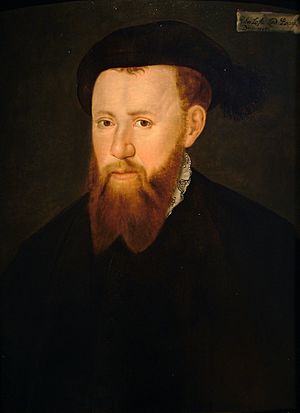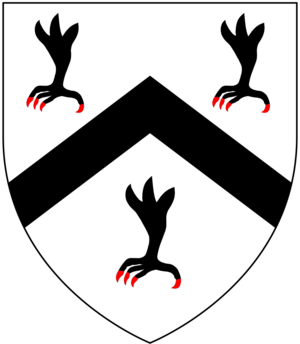John Braye, 2nd Baron Braye facts for kids
Quick facts for kids
John Braye
|
|
|---|---|
| 2nd Baron Braye | |

Portrait of John Braye by an unknown artist
|
|
| Died | 19 November 1557 London, England |
| Noble family | Braye |
| Spouse(s) | Anne Talbot |
| Father | Edmund Braye, 1st Baron Braye |
| Mother | Jane Halliwell |
John Braye, 2nd Baron Braye (who died on November 19, 1557) was an important English nobleman, a member of the royal court, and a soldier during the Tudor period. This was a time when the Tudor family ruled England.
Contents
John Braye's Family Background
John Braye was the son of Edmund Braye. His father became the first Baron Braye in 1529. John's mother was Jane Halliwell.
John was the only son in his family. He had six sisters:
- Anne, who married George Brooke, 9th Baron Cobham
- Elizabeth, who married Sir Ralph Verney
- Frideswide, who married Sir Percival Hart
- Mary, who married Sir Robert Peckham
- Dorothy, who married Edmund Brydges, 2nd Baron Chandos
- Frances, who married Thomas Lilfield
When his father passed away in 1539, John became the second Baron Braye. He was still young, so a guardian, Francis Talbot, 5th Earl of Shrewsbury, was chosen for him. Later, John married Talbot's daughter, Anne. They did not have any children together.
John Braye's Career and Service
John Braye was a member of Parliament from 1545 to 1555. He was also an important military leader during the Tudor period.
Military Actions and Campaigns
Near the end of King Henry VIII's rule, John Braye was one of the commanders. He joined the Earl of Hertford on a military trip into France.
Later, during the time of King Edward VI, there were some rebellions. John Braye was sent with William Parr, 1st Marquess of Northampton to stop a major uprising in Norfolk called Kett's Rebellion.
Challenges with Queen Mary
John Braye faced some difficulties with Queen Mary. He was heard saying he preferred her sister to be queen. Because of this, he was arrested in May 1556. People thought he might be involved in a plot against the queen.
His wife tried hard to get him released, but it didn't work at first. However, he was eventually pardoned and set free in May 1557.
Battle of St. Quentin
Soon after his release, John Braye traveled to Europe. There, he joined the combined Spanish and English forces. He fought in the Battle of St. Quentin (1557). His pardon might have happened because of Queen Mary's husband, Philip II of Spain. Philip was known for helping to free political prisoners who were also good soldiers.
Death and Title Succession
After the Battle of St. Quentin, John Braye returned to England. Sadly, he died from his wounds on November 19, 1557. He was buried at Chelsea Old Church.
Since John Braye had no children and no brothers, his title, Baron Braye, became inactive. It remained inactive for almost 300 years. In 1839, the title was given to Sarah Otway-Cave. She was a descendant of John's sister Elizabeth.
John Braye's widow later married Thomas Wharton, 1st Baron Wharton.
 | DeHart Hubbard |
 | Wilma Rudolph |
 | Jesse Owens |
 | Jackie Joyner-Kersee |
 | Major Taylor |


